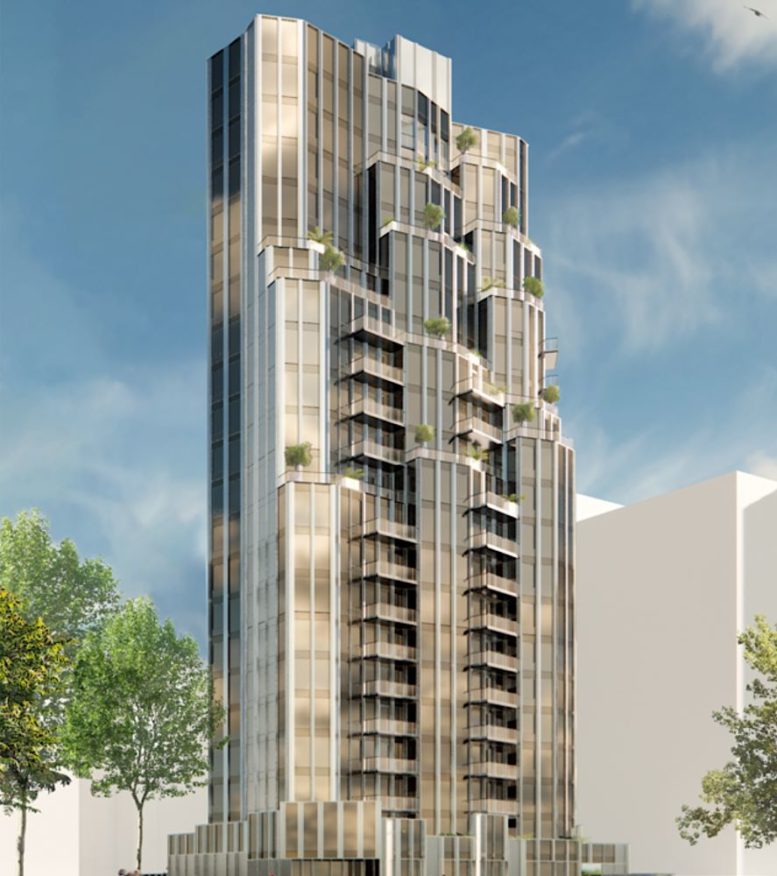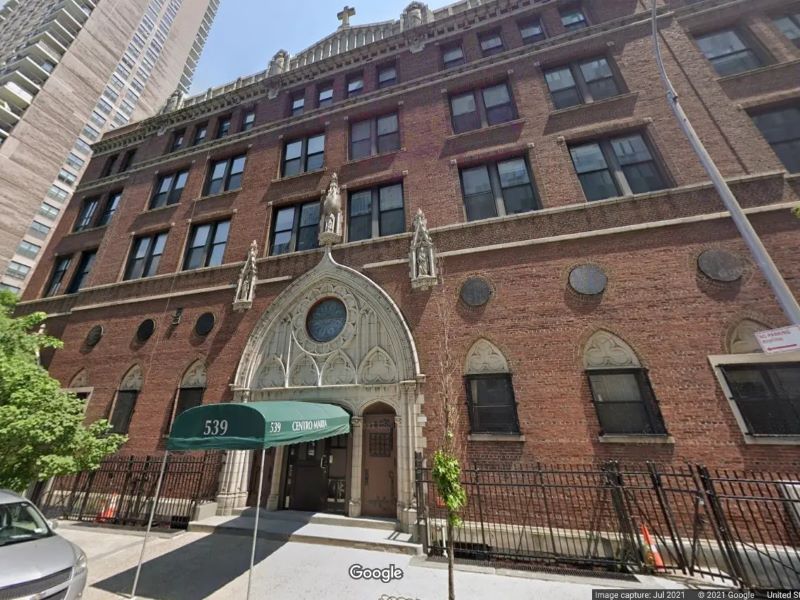A former church and women’s home at 539 West 54th Street in Hell’s Kitchen, Manhattan, will soon be replaced by a 21-story residential tower designed by GF55 Architects. The first rendering of the forthcoming structure was revealed by Excel Development Group earlier this week along with construction permits filed with New York City’s Department of Buildings.
When complete, the building will comprise 104,000 square feet with 71 units, an unspecified collection of amenity spaces, and a community facility on the first and second floors. The rendering shows a sleek façade with a glass curtain wall framed with metallic paneling. The massing incorporates a number of stepped setbacks topped with landscaping, as well as two stacks of balconies near the center of the main elevation.
The development site is currency occupied by the century-old St. Ambrose’s Church and Centro Maria, one of the city’s last remaining all-women’s boarding houses. The facility offered extremely low weekly rent, which included a shared room and meals provided by a staff of live-in Catholic nuns.
In August 2020, The Catholic Church ordered the parish and residence to be vacated, then sold the property to Excel Development Group for $25 million two years later. As reported by The City, the Catholic Church told tenants that it had to sell the building to raise money to cover legal costs from hundreds of abuse lawsuits.
Demolition permits have already been filed and approved by the Department of Buildings. The project team has not announced when the building is expected to debut.
Subscribe to YIMBY’s daily e-mail
Follow YIMBYgram for real-time photo updates
Like YIMBY on Facebook
Follow YIMBY’s Twitter for the latest in YIMBYnews







The result of selling the parish and residence to developers to “raise money to cover legal costs from hundreds of abuse lawsuits”…Wow.
That certainly isn’t good. :/
It’s a decent-looking building with an interesting history. But, I’m not going to be too sad to see it go.
Thomas you’re despicable to approve of this project!
For decades, young women from all over the world looking for a safe, affordable place to live in New York found a home at Centro Maria.
The large boarding house on West 54th Street — one of the last women-only homes in Manhattan — took in tenants for a few hundred dollars a month, which included two meals a day prepared by the Catholic nuns who operate and live in the residence.
Because of the Sisters of Mary Immaculate, current and former residents say the house is much more than just a place to stay — it has been a safe haven and a launch pad for new friendships and careers.
“The bond that you create in that house is unlike anything I’ve ever experienced — ever, ever,” said B.C.E., a previous resident who moved to Centro Maria in 2007 to escape an abusive relationship and didn’t want her full name used. “It’s your family.”
Now the family is being kicked out.
The nuns and residents living there have been told by the Archdiocese of New York that they must leave by August 31, several people with knowledge of the plan told THE CITY.
Members and sponsors make THE CITY possible.
They say the Archdiocese had been threatening to close Centro Maria and sell the 1910 building — a 30,000-square-foot, four-story property in Hell’s Kitchen — for at least a year.
But earlier this month, the sources said, the Church made a final decision to shutter the residence and told Centro Maria’s leadership the sale is needed to raise funds to pay for hundreds of sexual abuse lawsuits.
This would not the first time the Church used its considerable real estate holdings in New York to finance settlements of sexual abuse cases. In 2017, the Archdiocese took out a $120 million mortgage on a Madison Avenue property to fund a settlement program.
Since the Child Victims Act took effect last August, about 3,800 lawsuits have been filed in New York under the new law. Earlier this month, Governor Andrew Cuomo extended the deadline for filing for an additional year, to August 2021.
Catholic Charities, a ministry of the Archdiocese that owns the Centro Maria building, did not address questions in connection with the lawsuits.
But in a statement, Philip Dorian, senior director of federation advancement for Catholic Charities, said the Sisters told the organization in early August that “after reviewing their finances and looking at the impact of COVID-19, they would need to close their ministry at Centro Maria Residence.”
Calls and emails by THE CITY to the Sisters at Centro Maria were not returned. The Archdiocese of New York, too, did not return inquiries about the home’s future.
A ‘Calamity’ for the Community
“The nuns feel, and rightly so, they can’t speak against the Church,” said Regina Sakrani, a resident of Centro Maria between 1977 and 1980 who has organized annual fundraisers at the home for years.
“They live their lives walking the walk,” she said. “As a former resident, as someone who has had close associations with Centro, it saddens me. It pains me. I feel it is such, such, such a loss.”
The decision has been a gut punch to the entire Centro Maria community, according to Natasha Lewis, a lawyer and women’s rights advocate who lived at the home while working as an intern at the United Nations in 2010. She now lives in London, but stays in touch with the Centro Maria family through a WhatsApp chat group of dozens of the home’s alums and current staff.
There, she said, women brainstormed ways to try to save the home. Many wrote letters to the Pope and other Church officials.
Few wanted to speak publicly about the situation, but Lewis said she felt the need to talk about a place that was “safe and accessible, particularly for women of color.” Everyone was welcome, regardless of their religion. Lewis, a New Zealander originally from India, felt at home with the Spanish-speaking nuns and housemates from all corners of the globe. Young dancers at the Alvin Ailey studio, located two blocks away, often rented rooms.
“To me, the symbolism of closing down a place that is for women and girls in need, that is run by women who’ve dedicated their lives to helping other women and girls, in order to pay the legal fees of men who have abused children, and abused women, is despicable,” Lewis said.
The annual Centro Maria fundraising bazaar in 2019.Courtesy of Regina Sakrani
Jean Miles, a 95-year-old former nun who lived and worked at Centro Maria for decades until last year, said the situation is “a calamity.”
Members and sponsors make THE CITY possible.
“They’ve been looking around to see if they can find another place, but it’s practically impossible,” she said.
All those who spoke with THE CITY about Centro Maria said the home has been struggling financially in recent years, and COVID-19 did not help. Before March, the home would regularly host between 70 and 80 young women. During the pandemic, many residents moved away and that number fell to about 10, or less.
Former resident B.C.E. said she spoke with a current house staffer who said Centro’s leadership was encouraged to keep mum — with a promise.
“They have been told if they keep quiet, if they don’t make any noise, maybe in however long, they will be given another house,” she said.
Dorian of Catholic Charities said a new location is on the table.
“We realize how difficult and sad this decision is. We are working with the sisters to make their transition as smooth as possible, including exploring their ministry elsewhere in New York,” he said. “Catholic Charities has been exploring options for the future use of the building.”
Last Goodbyes
On August 15, the last remaining Centro Maria residents took a goodbye outing to Tarrytown “in the face of the imminent closure of the residence,” a post from the residence’s blog said, written in Spanish.
On Friday, movers carried boxes and belongings out of the house into a moving truck. On the residence’s Facebook page, dozens of people posted their condolences about the closure.
Movers carry boxes out of Centro Maria, Aug. 21, 2020.Hiram Alejandro Durán/THE CITY
Lewis knows it is likely too late to save the house, but she hopes the Church leadership at least give more time to the Sisters, especially the elderly nuns who have called Centro Maria home for decades.
“I find it extremely heartbreaking to think that right after this pandemic — and the huge crisis that New York has been through, and the U.S. and the world is going through — that they would be displaced, particularly the ones who’ve lived there for many years,” she said.
Miles, the former nun, believes the Sisters will land on their feet, likely at a Centro Maria location in another city. But they aren’t primarily concerned for themselves.
“The nuns, of course, are worried what will happen to the girls.”
Wow. They got a steal for 25 million.
That’s right, make the nuns pay for the pedophile priests.
The new building looks great I like the angles and set backs, like a modern version of a lot of the old warehouses.
For decades, young women from all over the world looking for a safe, affordable place to live in New York found a home at Centro Maria.
The large boarding house on West 54th Street — one of the last women-only homes in Manhattan — took in tenants for a few hundred dollars a month, which included two meals a day prepared by the Catholic nuns who operate and live in the residence.
Because of the Sisters of Mary Immaculate, current and former residents say the house is much more than just a place to stay — it has been a safe haven and a launch pad for new friendships and careers.
“The bond that you create in that house is unlike anything I’ve ever experienced — ever, ever,” said B.C.E., a previous resident who moved to Centro Maria in 2007 to escape an abusive relationship and didn’t want her full name used. “It’s your family.”
Now the family is being kicked out.
The nuns and residents living there have been told by the Archdiocese of New York that they must leave by August 31, several people with knowledge of the plan told THE CITY.
Members and sponsors make THE CITY possible.
They say the Archdiocese had been threatening to close Centro Maria and sell the 1910 building — a 30,000-square-foot, four-story property in Hell’s Kitchen — for at least a year.
But earlier this month, the sources said, the Church made a final decision to shutter the residence and told Centro Maria’s leadership the sale is needed to raise funds to pay for hundreds of sexual abuse lawsuits.
This would not the first time the Church used its considerable real estate holdings in New York to finance settlements of sexual abuse cases. In 2017, the Archdiocese took out a $120 million mortgage on a Madison Avenue property to fund a settlement program.
Since the Child Victims Act took effect last August, about 3,800 lawsuits have been filed in New York under the new law. Earlier this month, Governor Andrew Cuomo extended the deadline for filing for an additional year, to August 2021.
Catholic Charities, a ministry of the Archdiocese that owns the Centro Maria building, did not address questions in connection with the lawsuits.
But in a statement, Philip Dorian, senior director of federation advancement for Catholic Charities, said the Sisters told the organization in early August that “after reviewing their finances and looking at the impact of COVID-19, they would need to close their ministry at Centro Maria Residence.”
Calls and emails by THE CITY to the Sisters at Centro Maria were not returned. The Archdiocese of New York, too, did not return inquiries about the home’s future.
A ‘Calamity’ for the Community
“The nuns feel, and rightly so, they can’t speak against the Church,” said Regina Sakrani, a resident of Centro Maria between 1977 and 1980 who has organized annual fundraisers at the home for years.
“They live their lives walking the walk,” she said. “As a former resident, as someone who has had close associations with Centro, it saddens me. It pains me. I feel it is such, such, such a loss.”
The decision has been a gut punch to the entire Centro Maria community, according to Natasha Lewis, a lawyer and women’s rights advocate who lived at the home while working as an intern at the United Nations in 2010. She now lives in London, but stays in touch with the Centro Maria family through a WhatsApp chat group of dozens of the home’s alums and current staff.
There, she said, women brainstormed ways to try to save the home. Many wrote letters to the Pope and other Church officials.
Few wanted to speak publicly about the situation, but Lewis said she felt the need to talk about a place that was “safe and accessible, particularly for women of color.” Everyone was welcome, regardless of their religion. Lewis, a New Zealander originally from India, felt at home with the Spanish-speaking nuns and housemates from all corners of the globe. Young dancers at the Alvin Ailey studio, located two blocks away, often rented rooms.
“To me, the symbolism of closing down a place that is for women and girls in need, that is run by women who’ve dedicated their lives to helping other women and girls, in order to pay the legal fees of men who have abused children, and abused women, is despicable,” Lewis said.
The annual Centro Maria fundraising bazaar in 2019.Courtesy of Regina Sakrani
Jean Miles, a 95-year-old former nun who lived and worked at Centro Maria for decades until last year, said the situation is “a calamity.”
Members and sponsors make THE CITY possible.
“They’ve been looking around to see if they can find another place, but it’s practically impossible,” she said.
All those who spoke with THE CITY about Centro Maria said the home has been struggling financially in recent years, and COVID-19 did not help. Before March, the home would regularly host between 70 and 80 young women. During the pandemic, many residents moved away and that number fell to about 10, or less.
Former resident B.C.E. said she spoke with a current house staffer who said Centro’s leadership was encouraged to keep mum — with a promise.
“They have been told if they keep quiet, if they don’t make any noise, maybe in however long, they will be given another house,” she said.
Dorian of Catholic Charities said a new location is on the table.
“We realize how difficult and sad this decision is. We are working with the sisters to make their transition as smooth as possible, including exploring their ministry elsewhere in New York,” he said. “Catholic Charities has been exploring options for the future use of the building.”
Last Goodbyes
On August 15, the last remaining Centro Maria residents took a goodbye outing to Tarrytown “in the face of the imminent closure of the residence,” a post from the residence’s blog said, written in Spanish.
On Friday, movers carried boxes and belongings out of the house into a moving truck. On the residence’s Facebook page, dozens of people posted their condolences about the closure.
Movers carry boxes out of Centro Maria, Aug. 21, 2020.Hiram Alejandro Durán/THE CITY
Lewis knows it is likely too late to save the house, but she hopes the Church leadership at least give more time to the Sisters, especially the elderly nuns who have called Centro Maria home for decades.
“I find it extremely heartbreaking to think that right after this pandemic — and the huge crisis that New York has been through, and the U.S. and the world is going through — that they would be displaced, particularly the ones who’ve lived there for many years,” she said.
Miles, the former nun, believes the Sisters will land on their feet, likely at a Centro Maria location in another city. But they aren’t primarily concerned for themselves.
“The nuns, of course, are worried what will happen to the girls.”
Shame to see another beautiful church being demolished, but it’s future landfill will be replaced by much needed “nun free” housing!
Looks like the elegant tapered top of a tower 3+ times it’s height.
F*** the catholic church
this sucks big time.
The catholic Church should be ashamed and BTW they don’t pay any real estate taxes either .
For decades, young women from all over the world looking for a safe, affordable place to live in New York found a home at Centro Maria.
The large boarding house on West 54th Street — one of the last women-only homes in Manhattan — took in tenants for a few hundred dollars a month, which included two meals a day prepared by the Catholic nuns who operate and live in the residence.
Because of the Sisters of Mary Immaculate, current and former residents say the house is much more than just a place to stay — it has been a safe haven and a launch pad for new friendships and careers.
“The bond that you create in that house is unlike anything I’ve ever experienced — ever, ever,” said B.C.E., a previous resident who moved to Centro Maria in 2007 to escape an abusive relationship and didn’t want her full name used. “It’s your family.”
Now the family is being kicked out.
The nuns and residents living there have been told by the Archdiocese of New York that they must leave by August 31, several people with knowledge of the plan told THE CITY.
They say the Archdiocese had been threatening to close Centro Maria and sell the 1910 building — a 30,000-square-foot, four-story property in Hell’s Kitchen — for at least a year.
But earlier this month, the sources said, the Church made a final decision to shutter the residence and told Centro Maria’s leadership the sale is needed to raise funds to pay for hundreds of sexual abuse lawsuits.
This would not the first time the Church used its considerable real estate holdings in New York to finance settlements of sexual abuse cases. In 2017, the Archdiocese took out a $120 million mortgage on a Madison Avenue property to fund a settlement program.
Since the Child Victims Act took effect last August, about 3,800 lawsuits have been filed in New York under the new law. Earlier this month, Governor Andrew Cuomo extended the deadline for filing for an additional year, to August 2021.
Catholic Charities, a ministry of the Archdiocese that owns the Centro Maria building, did not address questions in connection with the lawsuits.
But in a statement, Philip Dorian, senior director of federation advancement for Catholic Charities, said the Sisters told the organization in early August that “after reviewing their finances and looking at the impact of COVID-19, they would need to close their ministry at Centro Maria Residence.”
Calls and emails by THE CITY to the Sisters at Centro Maria were not returned. The Archdiocese of New York, too, did not return inquiries about the home’s future.
A ‘Calamity’ for the Community
“The nuns feel, and rightly so, they can’t speak against the Church,” said Regina Sakrani, a resident of Centro Maria between 1977 and 1980 who has organized annual fundraisers at the home for years.
“They live their lives walking the walk,” she said. “As a former resident, as someone who has had close associations with Centro, it saddens me. It pains me. I feel it is such, such, such a loss.”
The decision has been a gut punch to the entire Centro Maria community, according to Natasha Lewis, a lawyer and women’s rights advocate who lived at the home while working as an intern at the United Nations in 2010. She now lives in London, but stays in touch with the Centro Maria family through a WhatsApp chat group of dozens of the home’s alums and current staff.
There, she said, women brainstormed ways to try to save the home. Many wrote letters to the Pope and other Church officials.
Few wanted to speak publicly about the situation, but Lewis said she felt the need to talk about a place that was “safe and accessible, particularly for women of color.” Everyone was welcome, regardless of their religion. Lewis, a New Zealander originally from India, felt at home with the Spanish-speaking nuns and housemates from all corners of the globe. Young dancers at the Alvin Ailey studio, located two blocks away, often rented rooms.
“To me, the symbolism of closing down a place that is for women and girls in need, that is run by women who’ve dedicated their lives to helping other women and girls, in order to pay the legal fees of men who have abused children, and abused women, is despicable,” Lewis said.
Jean Miles, a 95-year-old former nun who lived and worked at Centro Maria for decades until last year, said the situation is “a calamity.”
“They’ve been looking around to see if they can find another place, but it’s practically impossible,” she said.
All those who spoke with THE CITY about Centro Maria said the home has been struggling financially in recent years, and COVID-19 did not help. Before March, the home would regularly host between 70 and 80 young women. During the pandemic, many residents moved away and that number fell to about 10, or less.
Former resident B.C.E. said she spoke with a current house staffer who said Centro’s leadership was encouraged to keep mum — with a promise.
“They have been told if they keep quiet, if they don’t make any noise, maybe in however long, they will be given another house,” she said.
Dorian of Catholic Charities said a new location is on the table.
“We realize how difficult and sad this decision is. We are working with the sisters to make their transition as smooth as possible, including exploring their ministry elsewhere in New York,” he said. “Catholic Charities has been exploring options for the future use of the building.”
Last Goodbyes
On August 15, the last remaining Centro Maria residents took a goodbye outing to Tarrytown “in the face of the imminent closure of the residence,” a post from the residence’s blog said, written in Spanish.
On Friday, movers carried boxes and belongings out of the house into a moving truck. On the residence’s Facebook page, dozens of people posted their condolences about the closure.
Movers carry boxes out of Centro Maria, Aug. 21, 2020.Hiram Alejandro Durán/THE CITY
Lewis knows it is likely too late to save the house, but she hopes the Church leadership at least give more time to the Sisters, especially the elderly nuns who have called Centro Maria home for decades.
“I find it extremely heartbreaking to think that right after this pandemic — and the huge crisis that New York has been through, and the U.S. and the world is going through — that they would be displaced, particularly the ones who’ve lived there for many years,” she said.
Miles, the former nun, believes the Sisters will land on their feet, likely at a Centro Maria location in another city. But they aren’t primarily concerned for themselves.
“The nuns, of course, are worried what will happen to the girls.”
Wait—so are we mad at the building, or the Church? I suppose even Christian Charity has a price! (They could have sold some art, but…)
Wow. Would it be a price payed knowing that the child abuse was taking place and, is taking place and NOT speaking about it?
Nice looking building-Some of the previous comments are very long winded-calm down